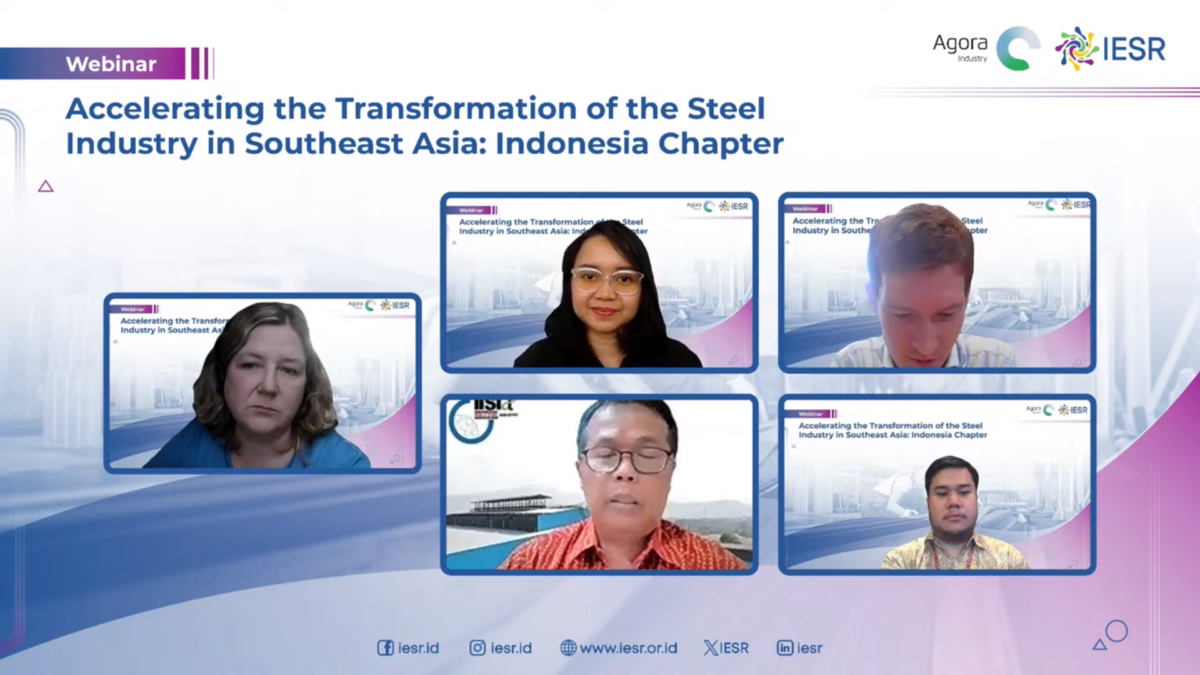Jakarta, 20 March 2024 – The industrial sector is one of the important sectors for reducing emissions. The large energy consumption and its significant contribution to the economy in 2022 amounting to 16.48 percent of Gross Domestic Product (GDP), are strong reasons to make this sector more sustainable. Industries with high energy needs, such as the iron and steel industry, require strategic preparation to carry out decarbonization.
Indonesia is one of the largest steel producing countries in Southeast Asia, and ranks number 15 steel producers in the world. In 2023, Indonesia’s steel production capacity will reach 16 million tonnes and is estimated to reach 33-35 million tonnes in 2030.
Fabby Tumiwa, Executive Director of the Institute for Essential Services Reform (IESR), in the webinar “Accelerating the Transformation of the Steel Industry in Southeast Asia: Indonesia Chapter” stated that Indonesian steel production still has high emissions.
“Indonesia’s projected steel demand is predicted to increase. If we don’t take serious decarbonization steps, emissions from the steel industry will also continue to increase,” said Fabby.
We also face international market demands to produce lower carbon steel. For example, the European Union has implemented the Carbon Border Adjustment Mechanism (CBAM), which, effective in 2026, will have a negative effect on the exports of the Indonesian steel industry. For this reason, the steel industry needs to undergo transformation.
Farid Wijaya, Senior Analyst at IESR, explained that decarbonization for the steel industry will bring prospects for economic growth, although currently there are still quite a lot of challenges.
“Green industrial standards can be one way to encourage environmentally friendly industries. Green standards for steel have only recently been established and are still limited to sheet steel per layer. “Currently there is no steel industry that has received a green certificate due to implementation limitations,” said Farid.
Kajol, Program Manager for Climate Neutral Industry Southeast Asia, Agora Industry, added that currently almost 80% of steel production is carried out through blast furnace technology.
“We have to start thinking about better and modern technology to replace blast furnaces. “When the blast furnace facilities currently operating start to become less efficient in 2030-2040, we must replace them with more modern technology and no longer invest in blast furnaces,” she explained.
One of the technologies Kajol refers to is Direct Reduced Iron (DRI) which can produce primary steel using natural gas or clean hydrogen. Iron ore is reduced to produce DRI, which can then be melted in an electric arc furnace (EAF) to produce primary steel.
Viable strategies for decarbonizing the steel industry include direct and indirect use of renewable energy, resource efficiency and circular economy, and closing the carbon cycle.
Helenna Ariesty, Sustainability Manager of PT Gunung Raja Paksi (GRP) as an industry player emphasized the importance of regulatory certainty in encouraging industrial decarbonization.
“We face several challenges to navigate the inconsistent policy direction. Apart from that, access to funding is affordable considering the initial investment required is significant,” Helenna said.
Joseph Cordonnier, Industrial Policy Analyst, OECD agrees that policy and access to funding will be key framework components for building a supporting ecosystem for industrial decarbonization.
“As part of this framework we also have to really look at how to maximize the utilization of existing assets based on engineering variables, energy efficiency and emission reduction of these assets,” said Joseph.
Fausan Arif Darmaji, Infrastructure Development Analyst, Green Industry Center, Ministry of Industry said the government is aware of the need to reduce emissions from Indonesian steel production.
“The steel sector is also our current focus. “While we are waiting for the policy regulations that are currently being made, we are providing training on GHG calculations for the steel sector, as well as calculating the economic value of carbon,” said Fausan.
Deon Arinaldo, IESR Energy Transformation Program Manager closed this webinar by underlining the need for industrial decarbonization as an effort to remain relevant to the demands of industrial development.
“Currently decarbonization in the industrial sector is still considered a challenge. Not only in Indonesia, but also a global phenomenon. “We must anticipate this trend because decarbonization is inevitable,” said Deon.

